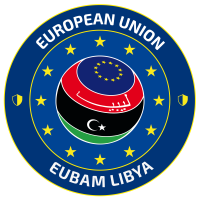Civilian Operations Commander Esteban-Perez Visits EUBAM Libya

EUBAM Libya and its Head of Mission were delighted to welcome Commander Francisco Esteban-Perez on his first visit to one of the eleven EU Common Security and Defense Policy missions that he leads. His trip was just one of several recent high-level visits from Brussels to Libya, underlining the EU’s commitment to the Government of National Unity as it prepares the way for elections later this year. Indeed, Esteban-Perez travelled to Tripoli with EU Commissioner for Home Affairs, Ylva Johansson, with whom he met Prime Minister Abdulhamid Dbeibeh on his first day.
Clearly, the context of Libya’s still young transitional government played a role in the choice of EUBAM Libya as Esteban-Perez’s first trip to a mission since taking over command in October 2020. But so too, did the resilience EUBAM has shown in relocating to Tripoli in recent months; conflict in and around the capital, and the COVID-19 pandemic had unavoidably delayed a planned 2019 return, but as of July 2021 most of the Mission’s staff will once again be working in Libya.
Our Libyan partners’ enthusiasm to meet with Commander Esteban-Perez is testament to the close working relations the Mission has established. Together with the Head of Mission, Natalina Cea, and often accompanied by EU Ambassador, Jose Sabadell, in just four days, Esteban-Perez met not only the Prime Minister, but also Vice-President Musa al-Koni, Ministers of Justice and Interior, Halima Ibrahim and Khaled Mazen, as well as a host of senior representatives from partner agencies. These included the Director of Foreign Relations for the Prime Minister, the head of the National Team for Border Security and Management, the High Judicial council, the Border Guards, Libyan Customs and the General Administration for Border Security.
A common theme from most of the discussions was the Libyan preference for concrete deliverables. To this end, and as a result of his meeting with Esteban-Perez, Vice President al-Koni proposed the establishment of a Libya-EU Committee, to apply a comprehensive and integrated approach to their cooperation.
As well as discussions of EUBAM’s ongoing assistance to the Ministries of Interior and Justice - which focus on capacity building and institutional reform - new initiatives were also explored. The Ministry of Interior requested the EU to support the creation of the Joint Police Force to monitor the implementation of the ceasefire agreement. This would be formed by security forces from both sides of the former East-West divide, working together, and would be an important step in showing the feasibility of reunifying Libya’s splintered security apparatus.
Likewise, the Ministry of Justice invited EUBAM to take part in the preparations for an international conference on transitional justice that it will host in a couple of months. In response to other requests from the Ministry, EUBAM is looking into providing support to the Judicial Police and penitentiary legislation, building on the experiences of other CSDP Missions providing similar support in post conflict environments.
In many of the meetings, Libya’s southern border featured prominently in concerns expressed by our Libyan counterparts. Most of Libya’s over 4300 Kms of land borders run through sparsely populated and poorly delineated areas of the Sahara Desert; the complex challenges there include human trafficking, irregular migration, smuggling, organised crime and terrorism. In response to these concerns, the EU and EUBAM will look into providing Tripoli-based assistance and training to the Border Guards and to other Libyan border agencies to secure Libyan borders all over the country.
Bringing depth to all the discussions, and reflecting the EU’s ability to act with a range of tools, was the participation of Stefano Tomat, head of the EU’s Integrated Peace and Security Directorate. This allowed an emphasis of the EU’s holistic approach in its engagement beyond its borders, underlining its commitment to societal and political support as well as technical assistance. In this respect too, EUBAM has a role to play as a hub for coordination between different reform actors, including EU member states; as Ambassador Sabadell pointed out, EUBAM can act as a “multiplier and enabler”, especially when member states are better placed to respond to Libyan requests beyond the Mission’s mandate.
Of course, no visit to one of the missions under Esteban-Perez’s command would have been complete without his spending time with the Mission Members themselves. During his stay, the Commander met with the Mission’s Senior Management Team on several occasions, as well as participating in an all staff meeting, giving an opportunity for Mission Members to ask questions to him directly. There was also cause for celebration during medal ceremonies held in both Tripoli and the Mission’s Tunis sub-office, when national and international Mission Members received recognition for their service.
During the speech he gave at the Tripoli ceremony, Commander Esteban-Perez noted “we have in front of us a huge responsibility, but also a huge opportunity to demonstrate our true devotion to serving our countries and the EU, by supporting our partners”. For its part, the Mission intends to grasp this opportunity, to continue growing in numbers and capacity, and to deliver tangible results to its Libyan partners. In the spirit of the final words of the Commander’s address “let’s do it, all together, as a team” – a team that includes partners from across Europe and Libya, all working together to deliver on the Mission’s mandate and to ensure peace and stability in Libya.





